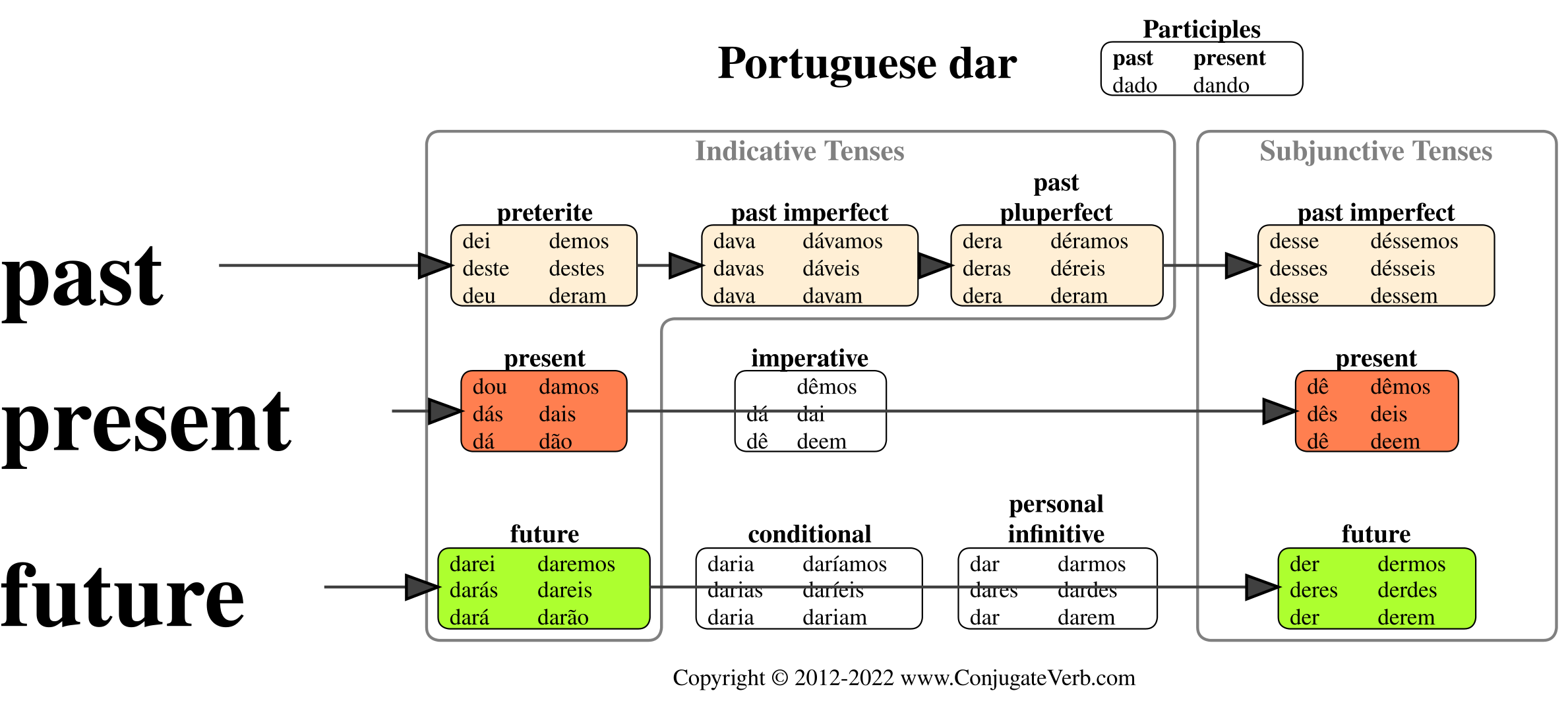Portuguese is a Romance language that is spoken by over 250 million people around the world. It is the official language of Portugal, Brazil, Angola, Mozambique, Cape Verde, Guinea-Bissau, and São Tomé and Príncipe.
As with any language, one of the most important aspects of Portuguese is verb conjugation. In this blog post, we will explore the intricacies of Portuguese verb conjugation and provide illustrations to help you understand the different verb tenses and forms.
Verbs in Portuguese
In Portuguese, verbs are the words that indicate actions, states, or events. They are the words that are used to express what someone or something is doing, what they did in the past, or what they will do in the future. Portuguese verbs are divided into three groups: -ar verbs, -er verbs, and -ir verbs. The endings of these verbs change depending on the tense, mood, and subject of the sentence.
Present Tense
The present tense in Portuguese is used to describe actions that are happening right now or actions that occur regularly. The present tense for -ar, -er, and -ir verbs is formed by removing the -ar, -er, or -ir ending and adding the following endings:
Eu (I) -o Tu (you) -as Ele/Ela/Você (he/she/you formal) -a Nós (we) -amos Vós (you all) -ais Eles/Elas/Vocês (they/you all formal) -am
Let’s take a look at some examples:
- Falar (to speak) Eu falo português. (I speak Portuguese.) Tu falas português. (You speak Portuguese.) Ele fala português. (He speaks Portuguese.) Nós falamos português. (We speak Portuguese.) Vós falais português. (You all speak Portuguese.) Eles falam português. (They speak Portuguese.)
- Comer (to eat) Eu como arroz e feijão. (I eat rice and beans.) Tu comes arroz e feijão. (You eat rice and beans.) Ele come arroz e feijão. (He eats rice and beans.) Nós comemos arroz e feijão. (We eat rice and beans.) Vós comeis arroz e feijão. (You all eat rice and beans.) Eles comem arroz e feijão. (They eat rice and beans.)
- Partir (to leave) Eu parto amanhã. (I leave tomorrow.) Tu partes amanhã. (You leave tomorrow.) Ele parte amanhã. (He leaves tomorrow.) Nós partimos amanhã. (We leave tomorrow.) Vós partis amanhã. (You all leave tomorrow.) Eles partem amanhã. (They leave tomorrow.)
Imperfect Tense
The imperfect tense in Portuguese is used to describe actions that happened regularly in the past or to describe a situation in the past. To form the imperfect tense, you take the stem of the verb and add the following endings:
Eu (I) -ava/-ia Tu (you) -avas/-ias Ele/Ela/Você (he/she/you formal) -ava/-ia Nós (we) -ávamos/-íamos Vós (you all) -áveis/-íeis Eles/Elas/Vocês (they/you all formal) -avam/-iam
Here are some more illustrations to help you understand Portuguese verb conjugation:
Preterite Tense
The preterite tense in Portuguese is used to describe actions that happened in the past, often at a specific point in time. The endings for -ar, -er, and -ir verbs are different in the preterite tense, and there are also irregular verbs that have unique conjugations in this tense.
Eu (I) -ei/-i Tu (you) -aste/-ste Ele/Ela/Você (he/she/you formal) -ou/-u Nós (we) -ámos/-emos/-imos Vós (you all) -astes/-estes/-istes Eles/Elas/Vocês (they/you all formal) -aram/-eram/-iram
Let’s take a look at some examples:
- Falar (to speak) Eu falei português ontem. (I spoke Portuguese yesterday.) Tu falaste português ontem. (You spoke Portuguese yesterday.) Ele falou português ontem. (He spoke Portuguese yesterday.) Nós falámos português ontem. (We spoke Portuguese yesterday.) Vós falastes português ontem. (You all spoke Portuguese yesterday.) Eles falaram português ontem. (They spoke Portuguese yesterday.)
- Comer (to eat) Eu comi arroz e feijão para o almoço. (I ate rice and beans for lunch.) Tu comeste arroz e feijão para o almoço. (You ate rice and beans for lunch.) Ele comeu arroz e feijão para o almoço. (He ate rice and beans for lunch.) Nós comemos arroz e feijão para o almoço. (We ate rice and beans for lunch.) Vós comeis arroz e feijão para o almoço. (You all ate rice and beans for lunch.) Eles comeram arroz e feijão para o almoço. (They ate rice and beans for lunch.)
- Partir (to leave) Eu parti ontem à noite. (I left last night.) Tu partiste ontem à noite. (You left last night.) Ele partiu ontem à noite. (He left last night.) Nós partimos ontem à noite. (We left last night.) Vós partistes ontem à noite. (You all left last night.) Eles partiram ontem à noite. (They left last night.)
Future Tense
The future tense in Portuguese is used to describe actions that will happen in the future. The future tense for -ar, -er, and -ir verbs is formed by taking the infinitive of the verb and adding the following endings:
Eu (I) -ei Tu (you) -ás Ele/Ela/Você (he/she/you formal) -á Nós (we) -emos Vós (you all) -eis Eles/Elas/Vocês (they/you all formal) -ão
Let’s take a look at some examples:
- Falar (to speak) Eu falarei português amanhã. (I will speak Portuguese tomorrow.) Tu falarás português amanhã. (You will speak Portuguese tomorrow.) Ele falará português amanhã. (He will speak Portuguese tomorrow.) Nós falaremos português amanhã. (We will speak Portuguese tomorrow.) Vós falareis português amanhã. (You all will speak Portuguese tomorrow.) Eles falarão port
- The majority of Portuguese verbs end with one of three suffixes: -er, -ar, or -ir and follow specific conjugation rules depending on their group. To properly conjugate a regular verb in Portuguese, you need to add different suffixes depending on the person, tense, and mood. However, irregular verbs such as “dar,” “fazer,” and “ir” have unique modifications even in their root during conjugation.
- To conjugate a Portuguese verb, you can input either its infinitive form (e.g. “querer,” “achar”) or a conjugated form like “acho,” “esteve,” or “querido.” The Portuguese Conjugator also recognizes reflexive forms such as “ver-se.”
- Portuguese conjugation tables are built on various models, and you can click on the appropriate section to learn more. The Conjugator tool can conjugate any verb as long as it corresponds to an existing conjugation model, including imaginary verbs, misspelled verbs, or trendy neologisms like “googlar,” “linkar,” or “escanear.”



